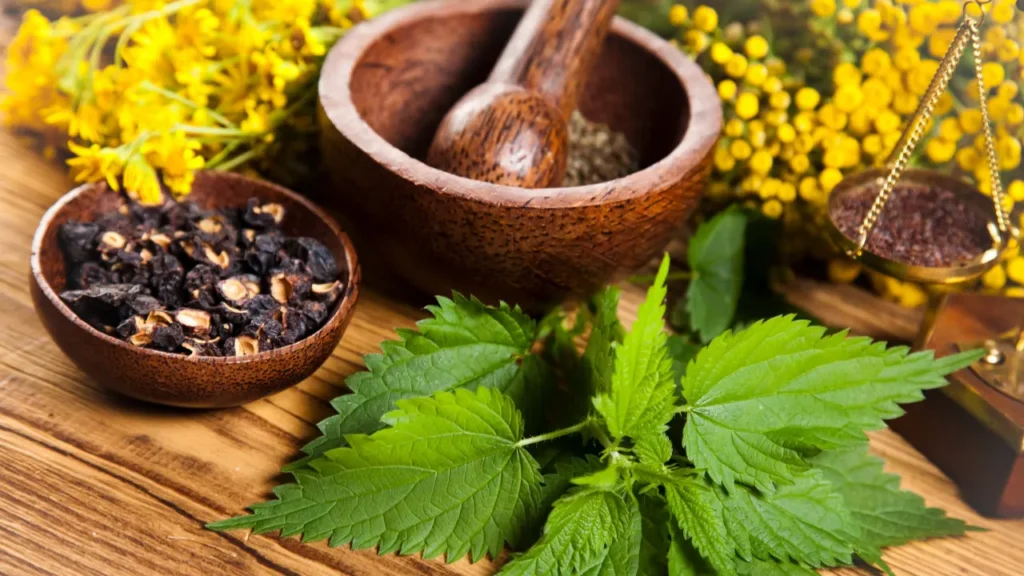Abuta (Cissampelos pareira) is a tropical plant with a long history of usage in traditional medicine for various therapeutic uses. Abuta, native to South America, Asia, and Africa, has piqued the scientific community’s interest due to its various pharmacological effects. This detailed analysis aims to shed light on the nutritional supplement’s nature, health benefits, recommended dosage, adverse effects, potential substance interactions, and responsible use. To promote Abuta’s safe and effective use, a complete understanding of the chemical and physiological mechanisms underpinning its effects on the body and brain is required.
You May Also Like:
Battle of the Brain Boosters: Brain MD Omega 3 Power vs. Kori Krill Oil Mind & Body
ONNIT Supplements Antarctic Krill Oil Reviewed: A Leading Memory Support Supplement
Abuta: Benefits, Dosage, Side Effects, Drug Interactions, And Other Important Information is an original (NootropicsPlanet) article.
Nature of Abuta
Cissampelos pareira, often known as Abuta or velvet leaf, is a member of the Menispermaceae family. The plant’s aerial parts, roots, and rhizomes contain a diverse array of biologically active chemicals, including alkaloids, flavonoids, sterols, and terpenoids. The bisbenzylisoquinoline alkaloids, including pareirubrine, hayatinin, and menispermacein, are considered the key bioactive elements responsible for Abuta’s medicinal actions.
Health Benefits of Abuta
Analgesic and anti-inflammatory properties
Abuta’s anti-inflammatory activities are due to its alkaloids, which suppress the formation of pro-inflammatory mediators such as nitric oxide (NO), prostaglandins, and cytokines. These mediators play a role in the inflammatory response and pain perception. Abuta’s ethanolic extract has been found in studies to have potent analgesic and anti-inflammatory effects in both acute and chronic inflammation models, making it a promising candidate for treating illnesses such as arthritis, edema, and other inflammatory disorders.
Antibacterial Activity
The antibacterial effects of Abuta have been extensively reported in the literature. Its alkaloids are bactericidal and fungicidal against a wide range of pathogens, including Gram-positive and Gram-negative bacteria and fungi. Abuta’s ability to break the cell membrane and limit the synthesis of nucleic acids and proteins in pathogens has been ascribed to its antibacterial function, making it a beneficial supplement in the treatment of infectious disorders.
Effects on Antioxidants and Hepatoprotection
The development of several diseases, including liver ailments, is influenced by oxidative stress, caused by an imbalance between reactive oxygen species (ROS) generation and the body’s antioxidant defenses. The antioxidant effects of Abuta are due to flavonoids and phenolic substances that scavenge ROS and protect cellular components from oxidative damage. Abuta has also been shown to have hepatoprotective properties, reducing liver damage caused by harmful chemicals such as carbon tetrachloride and acetaminophen. These features suggest that Abuta may be helpful in treating liver diseases and promoting overall liver health.
Anti-Cancer Activity
Abuta’s anti-cancer action is primarily due to its alkaloids, which suppress cancer cell proliferation and induce apoptosis. Abuta’s alkaloids have been shown in vitro and in vivo to have cytotoxic effects on various cancer cell lines, including breast, lung, and leukemia. Although further research is needed to understand Abuta’s anti-cancer mechanisms completely, it shows promise as a cancer treatment adjuvant.

Chemistry of Abuta
Understanding Abuta’s chemistry is critical for encouraging its safe and effective use. Abuta’s main bioactive ingredients are its bisbenzylisoquinoline alkaloids, which include pareirubrine, hayatinin, and menispermacein. In addition to alkaloids, Abuta has a variety of biologically active chemicals, including flavonoids, sterols, and terpenoids. These chemicals contribute to the plant’s various pharmacological activities.
Physiological Mechanisms of Action
Abuta’s bioactive components work on the body and brain via a variety of physiological pathways. Among the primary mechanisms are:
- Anti-inflammatory and analgesic properties: The alkaloids in Abuta prevent the formation of pro-inflammatory mediators such as nitric oxide (NO), prostaglandins, and cytokines, all of which contribute to the inflammatory response and pain perception. This inhibition reduces inflammation and pain in the afflicted tissues.
- Antimicrobial Activity: Abuta’s alkaloids’ ability to break cell membranes and hinder the formation of nucleic acids and proteins in pathogens is linked to their antimicrobial activity, which interferes with the regular functioning of microbial cells, resulting in their death.
- Antioxidant and Hepatoprotective Effects: Abuta’s flavonoids and phenolic compounds have antioxidant qualities, which help to protect cellular components from oxidative damage by scavenging reactive oxygen species (ROS). Furthermore, Abuta has been shown to have hepatoprotective benefits by avoiding liver harm caused by toxic chemicals and supporting liver health.
- Anti-cancer Activity: The alkaloids in Abuta have anti-cancer activities that suppress cancer cell proliferation and induce apoptosis, which causes cancer cells to die, potentially slowing tumor growth.
By studying these pathways, researchers can continue discovering new therapeutic applications for Abuta and optimize its use as a nutritional supplement.

Optimal Dosage of Abuta
The ideal Abuta dosage is determined by age, weight, and the health condition being treated. Adults should generally take 1-3 grams of Abuta dry root or rhizome powder daily. However, more study is needed to create standardized dosages for diverse formulations such as tinctures, extracts, and capsules. Before beginning any Abuta supplementation, it is critical to check with a healthcare practitioner because individual needs vary, and specific health problems may necessitate different quantities.
Side Effects of Abuta
When used in proper amounts and under the supervision of a healthcare practitioner, Abuta is generally regarded as safe. Some people, however, may develop side effects such as stomach discomfort, nausea, vomiting, and diarrhea. Abuta supplementation should be avoided by pregnant and breastfeeding women because its safety during pregnancy and lactation has not been thoroughly proven. Individuals having a history of liver or renal problems should use Abuta with caution because the long-term effects on these organs are unknown.

Potential Substance Interactions with Abuta
While Abuta’s possible drug interactions have not been thoroughly researched, preliminary evidence suggests that it may interact with some medications and supplements. Abuta’s anticoagulant characteristics, for example, may enhance the effects of anticoagulant drugs, increasing the risk of bleeding. Furthermore, its hepatoprotective actions may influence drug metabolism, altering efficacy or adverse effect profiles.
Given the scarcity of evidence on Abuta’s potential drug interactions, it is critical to seek the advice of a healthcare expert before mixing it with any prescriptions or supplements. This will help reduce the possibility of side effects while ensuring the safe and effective usage of Abuta.
Best Responsible Uses of Abuta
The following recommendations should be addressed to promote the best responsible usage of Abuta as a nutritional supplement:
- Before beginning Abuta supplementation, consult a healthcare practitioner, especially if you have pre-existing medical issues, are pregnant or breastfeeding, or are using drugs or other supplements.
- Begin with the lowest effective dose and gradually increase, if necessary, with the help of a healthcare expert. This method will help reduce the danger of adverse effects while ensuring the correct dosage for your unique needs.
- Purchase Abuta supplements from trustworthy retailers to verify product quality, safety, and efficacy. Look for goods that have been independently evaluated for purity and potency, and stay away from those that have extra fillers, fake additives, or unlisted chemicals.
- Monitor your reaction to Abuta supplementation and notify your healthcare provider of any adverse effects or concerns. This will allow them to make any required changes to your regimen and ensure that Abuta is used safely and effectively.
Abuta:
Conclusion
Abuta has been traditionally used to regulate menstrual cycles and alleviate symptoms associated with menstruation, such as cramps and irregular bleeding. Its uterine tonic properties may help support overall reproductive health in women. Abuta represents a valuable botanical remedy with potential applications in supporting inflammatory conditions, immune health, pain relief, digestive health, and menstrual health.
While Abuta offers promising health benefits, more research is needed to fully understand its mechanisms of action, optimal dosages, and potential interactions with medications. As with any herbal remedy, it’s essential to use Abuta under the guidance of a qualified healthcare professional, especially for individuals with specific health concerns or conditions. As interest in natural and holistic approaches to health continues to grow, Abuta offers an intriguing avenue for exploration and integration into modern healthcare practices.

References:
- Antimicrobial activity of Cissampelos pareira L. extracts against a panel of pathogenic bacteria. Link: https://www.sciencedirect.com/science/article/pii/S2210803316300307
- Anti-inflammatory and analgesic effects of Cissampelos pareira root extract. Link: https://www.researchgate.net/publication/260376554_Anti-inflammatory_and_analgesic_effects_of_Cissampelos_pareira_root_extract
- Antioxidant and hepatoprotective effects of Cissampelos pareira L. on carbon tetrachloride-induced liver injury in rats. Link: https://link.springer.com/article/10.1007%2Fs13596-012-0078-7
- Screening for Antimicrobial Activity of Cissampelos pareira L. Methanol Root Extract. Link: https://www.researchgate.net/publication/270286199_Screening_for_Antimicrobial_Activity_of_Cissampelos_pareira_L_Methanol_Root_Extract
- Cissampelos pareira L.: A review of its traditional uses, phytochemistry, and pharmacology. Link: https://www.sciencedirect.com/science/article/abs/pii/S0378874121000763
- Comparative antipyretic and analgesic activities of Cissampelos pareira Linn. and Cyclea peltata (Lam.) Hook. F. & Thomas. Link: https://www.ncbi.nlm.nih.gov/pmc/articles/PMC5541469/
Important Note: The information contained in this article is for general informational purposes only, and should not be construed as health or medical advice, nor is it intended to diagnose, prevent, treat, or cure any disease or health condition. Before embarking on any diet, fitness regimen, or program of nutritional supplementation, it is advisable to consult your healthcare professional in order to determine its safety and probable efficacy in terms of your individual state of health.
Regarding Nutritional Supplements Or Other Non-Prescription Health Products: If any nutritional supplements or other non-prescription health products are mentioned in the foregoing article, any claims or statements made about them have not been evaluated by the U.S. Food and Drug Administration, and such nutritional supplements or other health products are not intended to diagnose, treat, cure, or prevent any disease.


